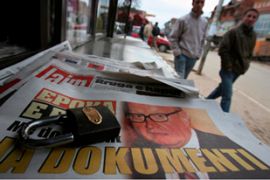UN envoy unveils Kosovo proposal
The plan lays out terms for “a future Kosovo that is viable, sustainable and stable.”

They also recommend that the province adopt its own constitution and be empowered “to negotiate and conclude international agreements, including the right to seek membership in international organizations.”
The plan drafted by Ahtisaari – which was being presented on Friday to Serbia’s president and later to Kosovo’s ethnic Albanian leadership – laid out terms for “a future Kosovo that is viable, sustainable and stable.”
The blueprint still needs approval from the UN security council.
Kosovo has been a UN protectorate since 1999, when NATO air-strikes stopped Serbia’s crackdown on separatist ethnic Albanian rebels. Ethnic Albanians, who account for 90 percent of Kosovo’s population of 2 million, have rejected Serbia’s offer of broad autonomy within Serbian borders and demand outright independence.
Diplomats warned that the plan would disappoint people on both sides of the ethnic divide.
“The Serbs will have to accept the loss of Kosovo,” a Western official said.
And Kosovo’s Albanian majority “will have to accept continued international presence, significant limitations on their sovereignty and a very generous package of rights for the Kosovo Serbs.”
Trappings of independence would include a flag and anthem along with the right to seek membership in international organizations – though a seat at the United Nations would by no means be assured.
If the proposal eventually wins security council approval, that would set the stage for the US and other countries to formally recognize Kosovo’s independence.
But there were concerns that the plan could trigger a showdown between the United States – long an advocate of an independent Kosovo – and Russia, a traditional ally of Serbia which wields veto power.
Stern rebuke
In a snub to Ahtisaari, Vojislav Kostunica, the Serbian prime minister, refused to meet with the former Finnish president, who met with Tadic instead.
Kostunica, a nationalist, is a fierce critic of Ahtisaari, whom he has accused of working in the interest of Kosovo’s Albanians and of ignoring Serbia’s claims to Kosovo as the heart of its ancient homeland.
Kostunica has threatened to cut off diplomatic ties with any country that recognises Kosovo as an independent state.
That drew a stern rebuke Thursday from the US Embassy in Belgrade, which issued a statement saying it was “very disappointed by this approach.”
In Kosovo, where only about 100,000 Serbs still live – many complaining they are subject to discrimination and reprisal attacks – some Serbs expressed doubts that the plan would adequately protect their minority.
Ahtisaari had said protecting the rights of Kosovo’s Serbs and other minorities was at the heart of the proposal.
Degree of control
For Serbs, the plan outlines “a high degree of control” over their own affairs by granting them six new Serb-administered municipalities and a greater voice in the higher education and health systems.
Serbs also would be granted “extensive municipal autonomy in financial matters, including the ability to accept transparent funding from Serbia.”
Agim Ceku, Kosovo’s prime minister, appealed for calm, and the 16,500-member NATO-led peacekeeping force stepped up patrols.
Ceku acknowledged that the plan would not please everyone.
“Not all will be what we anticipated, deserve or wish,” he said on Thursday.
The plan recommends the establishment of an international representative – similar to the office set up in Bosnia after that country’s bloody 1992-95 war – to oversee day-to-day affairs.
It also included provisions for a 2,500-member Kosovo security force which would be overseen by NATO.